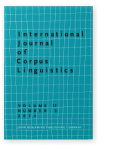Ferraresi, Adriano & Silvia Bernardini
Janda, Laura A., Masako Fidler, Václav Cvrček & Anna Obukhova
2023.
The case for case in Putin’s speeches.
Russian Linguistics 47:1
► pp. 15 ff.

Janebová, Markéta & Michaela Martinková
Jágrová, Klára & Tania Avgustinova
2023.
Intelligibility of Highly Predictable Polish Target Words in Sentences Presented to Czech Readers. In
Computational Linguistics and Intelligent Text Processing [
Lecture Notes in Computer Science, 13451],
► pp. 110 ff.

Rosen, Alexandr
2023.
The Intercorp Parallel Corpus with a Uniform Annotation for All Languages.
Journal of Linguistics/Jazykovedný casopis 74:1
► pp. 254 ff.

Roszko, Danuta & Roman Roszko
2023.
Linguistic Parallels Between the Lexemes of the Polish “Kilkanaście” and the Lithuanian “Keliolika” on the Basis of Data from Multilingual Parallel Corpora.
Slavia Meridionalis 23

Sokolova, Anastasija & Simona Koryčánková
2023.
Russian feminatives with expressive suffixes -ixa, -ša and their Czech translation equivalents: a corpus study.
Russian Linguistics 47:1
► pp. 41 ff.

Flinz, Carolina & Ruth M. Mell
2022.
Über den Nutzen der Korpuslinguistik für den DaF-Unterricht beim Lehren und Lernen nicht-flektierbarer Wörter – eine Mikro-Studie zur Intensitätspartikel ganz. In
Wissenschaften und ihr Dialog,
► pp. 211 ff.

Ivaska, Ilmari & Laura Ivaska
Bendová, Klára
2021.
Using a parallel corpus to adapt the Flesch Reading Ease formula to Czech.
Journal of Linguistics/Jazykovedný casopis 72:2
► pp. 477 ff.

Bendová, Klára & Silvie Cinková
2021.
Adaptation of Classic Readability Metrics to Czech. In
Text, Speech, and Dialogue [
Lecture Notes in Computer Science, 12848],
► pp. 159 ff.

Duszkin, Maksim, Danuta Roszko & Roman Roszko
2021.
New Parallel Corpora of Baltic and Slavic Languages — Assumptions of Corpus Construction. In
Text, Speech, and Dialogue [
Lecture Notes in Computer Science, 12848],
► pp. 172 ff.

Jágrová, Klára, Michael Hedderich, Marius Mosbach, Tania Avgustinova & Dietrich Klakow
2021.
On the Correlation of Context-Aware Language Models With the Intelligibility of Polish Target Words to Czech Readers.
Frontiers in Psychology 12

Milička, Jiří, Václav Cvrček & Lucie Lukešová
Roszko, Roman
2021.
O nowych ręcznie zrównoleglonych i znakowanych dwujęzycznych korpusach równoległych oraz ich zastosowaniach.
Acta Baltico-Slavica 45

Granger, Sylviane & Marie-Aude Lefer
2020.
Introduction.
Languages in Contrast 20:2
► pp. 167 ff.

Lefer, Marie-Aude
2020.
Parallel Corpora. In
A Practical Handbook of Corpus Linguistics,
► pp. 257 ff.

Lenz, Alexandra N., Fabian Fleißner, Agnes Kim & Stefan Michael Newerkla
2020.
give as a put verb in German – A case of German-Czech language contact?.
Journal of Linguistic Geography 8:2
► pp. 67 ff.

Terzić, Dušica, Saša Marjanović, Dejan Stosic & Aleksandra Miletic
2020.
Diversification of Serbian-French-English-Spanish Parallel Corpus ParCoLab with Spoken Language Data. In
Text, Speech, and Dialogue [
Lecture Notes in Computer Science, 12284],
► pp. 61 ff.

Doval, Irene, Santiago Fernández Lanza, Tomás Jiménez Juliá, Elsa Liste Lamas & Barbara Lübke
Jágrová, Klára, Tania Avgustinova, Irina Stenger & Andrea Fischer
2019.
Language models, surprisal and fantasy in Slavic intercomprehension.
Computer Speech & Language 53
► pp. 242 ff.

Kratochvílová, Dana
2019.
The Spanish future tense and cognitive perspective: Tense, modality, evidentiality and the reflection of the grounding process.
Lingua 230
► pp. 102713 ff.

Kratochvílová, Dana
2023.
Epistemic modality and grounding: constructions expressing positive epistemic judgement in Spanish and Italian from the perspective of cognitive grammar (with particular reference to the verbs credere and creer).
Probus 35:2
► pp. 327 ff.

Kyjánek, Lukáš & Jiří Haviger
2019.
The Measurement of Mutual Intelligibility between West-Slavic Languages.
Journal of Quantitative Linguistics 26:3
► pp. 205 ff.

Singh, Thoudam Doren & Thamar Solorio
2018.
Towards Translating Mixed-Code Comments from Social Media. In
Computational Linguistics and Intelligent Text Processing [
Lecture Notes in Computer Science, 10762],
► pp. 457 ff.

Benigni, Valentina
2017.
Una festa da paura! Mi sono divertito da morire! Gli intensificatori iperbolici dell’italiano e la loro resa in russo.
Annales Universitatis Paedagogicae Cracoviensis. Studia de Cultura 1:9
► pp. 5 ff.

Jurkiewicz-Rohrbacher, Edyta, Björn Hansen & Zrinka Kolaković
2017.
Clitic Climbing, Finiteness and the Raising-Control Distinction. A Corpus–based study.
Journal of Linguistics/Jazykovedný casopis 68:2
► pp. 179 ff.

Miletic, Aleksandra, Dejan Stosic & Saša Marjanović
2017.
ParCoLab: A Parallel Corpus for Serbian, French and English. In
Text, Speech, and Dialogue [
Lecture Notes in Computer Science, 10415],
► pp. 156 ff.

Nádvorníková, Olga
2017.
Pièges méthodologiques des corpus parallèles et comment les éviter.
Corela :HS-21

Nádvorníková, Olga
2021.
Contexts and Consequences of Sentence Splitting in Translation (English-French-Czech).
Research in Language 19:3
► pp. 229 ff.

Albano, Lorenzo, Domenico Beneventano & Sonia Bergamaschi
2015.
Proceedings of the 24th International Conference on World Wide Web,
► pp. 835 ff.

Christodouloupoulos, Christos & Mark Steedman
2015.
A massively parallel corpus: the Bible in 100 languages.
Language Resources and Evaluation 49:2
► pp. 375 ff.

This list is based on CrossRef data as of 4 july 2024. Please note that it may not be complete. Sources presented here have been supplied by the respective publishers.
Any errors therein should be reported to them.
